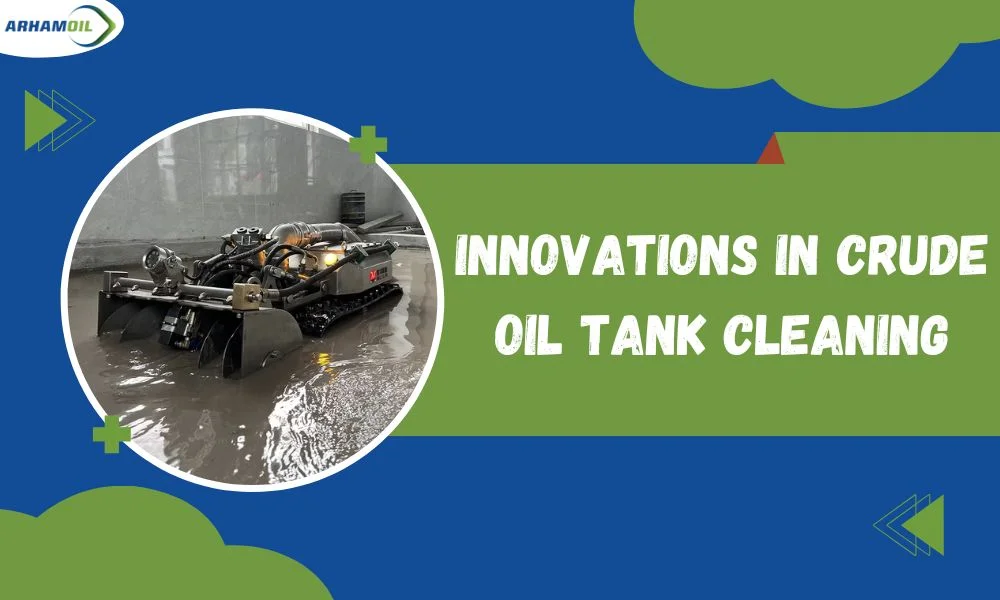Advancements in Oil Sludge Recovery Systems
December 21, 2024Biological Treatment of Oil Sludge: Eco-Friendly Solutions for the Oil Industry
January 22, 2025Crude oil storage tanks play a vital role in the global energy industry, serving as reservoirs for one of the most valuable resources. Over time, these tanks accumulate sludge, a mix of hydrocarbons, water, sediments, and other contaminants. Cleaning these tanks is essential for maintaining operational efficiency, ensuring environmental compliance, and maximizing hydrocarbon recovery. Thanks to technological advancements, crude oil tank cleaning has significantly transformed, focusing on minimizing hazardous waste and enhancing oil recovery.
The Challenges of Traditional Tank Cleaning Methods
Traditional tank cleaning methods were labor-intensive, time-consuming, and posed significant risks to workers. These processes often involved manual entry into confined spaces, exposing workers to hazardous fumes and materials. Additionally, traditional methods generated large volumes of waste, including sludge that required costly disposal. The inefficiency of these methods often led to the loss of recoverable hydrocarbons, further reducing the overall value extracted from the tank.
Advanced Technologies in Crude Oil Tank Cleaning
The emergence of advanced cleaning technologies has revolutionized the industry, addressing the shortcomings of traditional methods. These innovations prioritize safety, efficiency, and environmental sustainability, offering significant benefits to oil and gas companies. Below are some of the most impactful advancements:
1. Robotic Tank Cleaning
Robotic tank cleaning has become a cornerstone of modern tank cleaning operations. These systems eliminate the need for human entry, significantly reducing the risks associated with hazardous environments. Equipped with high-pressure nozzles and advanced sensors, robotic cleaners can navigate the interior of tanks with precision, breaking down sludge and sediment effectively.
Key Benefits:
- Enhanced safety by eliminating human entry.
- Improved cleaning efficiency with precise oil sludge removal.
- Reduced downtime, allowing for quicker tank re-commissioning.
2. Non-Man Entry Tank Cleaning
Non-man entry systems leverage advanced equipment to clean tanks remotely. These systems utilize high-pressure water jets, chemical cleaning agents, and mechanical tools to break down sludge and sediment. The waste is then extracted through vacuum systems, ensuring minimal environmental impact.
Key Benefits:
- Reduced waste generation and disposal costs.
- Maximized hydrocarbon recovery from sludge.
- Compliance with stringent environmental regulations.
3. Sludge Treatment and Oil Recovery Units
Modern sludge oil recovery and treatment units are designed to separate hydrocarbons from water and solids, recovering valuable oil that would otherwise be lost. These units employ processes such as centrifugation, thermal treatment, and chemical separation to maximize recovery.
Key Benefits:
- Recovery of up to 95% of hydrocarbons from sludge.
- Significant reduction in hazardous waste volume.
- Cost savings through reclaimed oil and reduced disposal expenses.
Environmental Impact: Reducing Hazardous Waste
One of the primary goals of modern tank cleaning innovations is to minimize the environmental footprint of the process. By integrating advanced technologies, companies can significantly reduce the volume of hazardous waste generated during cleaning operations.
Waste Minimization Techniques
- Hydrocarbon Recovery: Advanced separation techniques ensure that hydrocarbons are extracted from sludge, leaving behind less hazardous waste.
- Recycling and Reuse: Treated water and recovered oil can be reused in industrial processes, reducing the demand for fresh resources.
- Eco-Friendly Cleaning Agents: Biodegradable and non-toxic cleaning agents replace harsh chemicals, further reducing environmental harm.
Enhancing Oil Recovery: Turning Waste into Value
Recovering hydrocarbons from sludge is not just an environmental imperative but also a financial opportunity. By employing cutting-edge technologies, companies can transform waste into a valuable resource, contributing to both sustainability and profitability.
Maximizing Recovery Rates
- Centrifugal Separation: High-speed centrifuges separate oil, water, and solids with remarkable efficiency, ensuring minimal hydrocarbon loss.
- Thermal Desorption: Heat-based processes vaporize hydrocarbons, which are then condensed and collected for reuse.
- Chemical Enhancement: Specialized chemicals break down complex sludge structures, facilitating easier separation and recovery.
The Role of Automation and Data Analytics
Automation and data analytics are playing an increasingly important role in crude oil tank cleaning. Smart systems equipped with sensors and IoT devices provide real-time data on tank conditions, enabling predictive maintenance and efficient cleaning schedules.
Benefits of Data-Driven Cleaning
- Improved Efficiency: Real-time monitoring ensures that cleaning operations are targeted and effective.
- Predictive Maintenance: Early detection of sludge buildup prevents operational disruptions.
- Cost Optimization: Data insights enable better resource allocation, reducing overall cleaning costs.
The Future of Crude Oil Tank Cleaning
The crude oil tank cleaning industry is poised for further advancements, driven by the need for sustainability, safety, and efficiency. Emerging trends include:
- AI-Driven Cleaning Systems: Artificial intelligence will enhance the precision and adaptability of cleaning robots, further improving efficiency.
- Advanced Material Technologies: Innovations in materials will lead to more durable and effective cleaning tools.
- Global Collaboration: Industry partnerships will drive the development of standardized best practices and technologies.
To conclude, Innovations in crude oil tank cleaning are transforming the industry, offering solutions that enhance oil recovery, reduce hazardous waste, and improve safety. By embracing advanced technologies such as robotic cleaning systems, non-man entry methods, and sludge treatment units, companies can achieve operational excellence while meeting environmental and regulatory requirements. These advancements not only protect the environment but also unlock the full value of crude oil storage tanks, ensuring a sustainable and profitable future for the energy sector.


